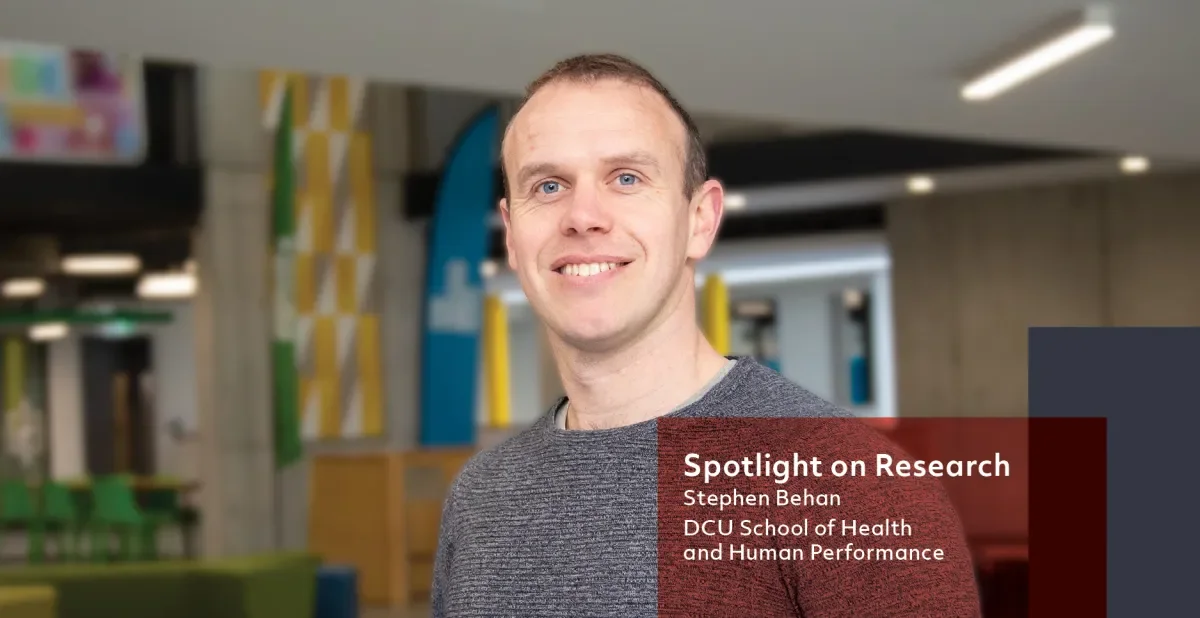

A hop, skip and jump towards more active, physically literate children
Stephen, your research is on a mission to get primary school kids moving and feel more confident about physical activity - were you an active kid yourself?
“Yes I have been involved in sport as long as I can remember – when I was about four or five, I was one of the first age groups to do the ‘nursery’ in our local GAA club in Glasnevin, Na Fianna. Then as we grew up, we would have been out training and running around and playing football all evening. Basically when the streetlights came on, it was time to go home! Even when I was studying to be a cabinet maker, I would typically play a match with Na Fianna on the Sunday in Dublin then I would get the bus to Letterfrack in Galway to carry out my studies there for the week. Being physically active was always part of life.”
How did you get into sports research?
“Because of my interest in sports, I went to work with the Dublin GAA as a coach, going into primary schools and teaching the kids to play football and hurling. I could see that the older kids, from 3rd-6th class, often had no interest in any physical activity. That really got me interested in studying exercise and sports science, so I did a Masters in University College Dublin. My project for that involved going into primary schools and seeing what effect it had to do 15 minutes of physical exercises like throwing a ball, skipping and balancing games before school.”
What kind of impact did that have?
We saw a massive result with 15 minutes a day, four days a week. Compared to the children who didn’t do the exercises in the intervention, the ones who did jumped 25% in terms of their fundamental movement skills, and the teachers reported that those students were much less giddy in class. They could immediately start on lessons rather than needing time to settle down.
What are you exploring now in your research?
“I’m doing a PhD at the Insight Centre for Data Analytics in DCU now, with the additional support of Dublin GAA and the GAA Research and Games Centre. The research is on how to build physical literacy in primary school children. It’s about kids getting to learn and use the basic building blocks of physical activity - things like running and jumping, kicking and throwing. That builds their skills and very importantly it builds their confidence in being physically active. Think about it – if they are playing football in class but they haven’t the skills to run and kick, they may be put off taking part, and this can turn into a negative spiral of not wanting to try other sports.”
How have you been looking at this?
“As part of the Moving Well - Being Well project, I’ve been working with colleagues in the DCU School of Health and Human Performance to collect and analyse information about lots of aspects of physical activity in more than 2,000 kids aged 5-12 in primary schools around Ireland, including their fundamental movement skills. This had not been measured before, and we could see that a large proportion of the children lacked these fundamental skills - for example around a quarter of the children who took part in the assessment hadn’t mastered running. So we designed an intervention to bring into schools where GAA coaches and teachers introduce these movement skills through games and activities, and the kids can do exercises with their parents at home, maybe doing 20 jumping jacks and then feeling your heart to see how fast it is beating.”
What have you been able to show in your research about the intervention?
That it works. We could see that the children who took part substantially increased their mastery of fundamental skills in just 10 weeks, and this effect was still strong even six months later.
What have been the biggest challenges and rewards of the research?
“Going out on the road around Ireland to test movement skills among children was a long trek – we spent 18 weeks testing. But on the positive side, it was brilliant to see the similarities and differences in the various schools we went to. I think another really rewarding thing for me is that I can see some of the kids who have taken part in the intervention getting involved in Na Fianna, where I am Vice-Chair of the club and I mentor teams. To see those young children engaging with the GAA and continuing to build those movement skills is really rewarding.”
How do you take a break?
I’m writing up my PhD at the moment, so I am particularly enjoying the chance to get out and go training or play GAA matches. I also like to go to matches as a spectator too. It’s a good way to get some time away from the computer.
